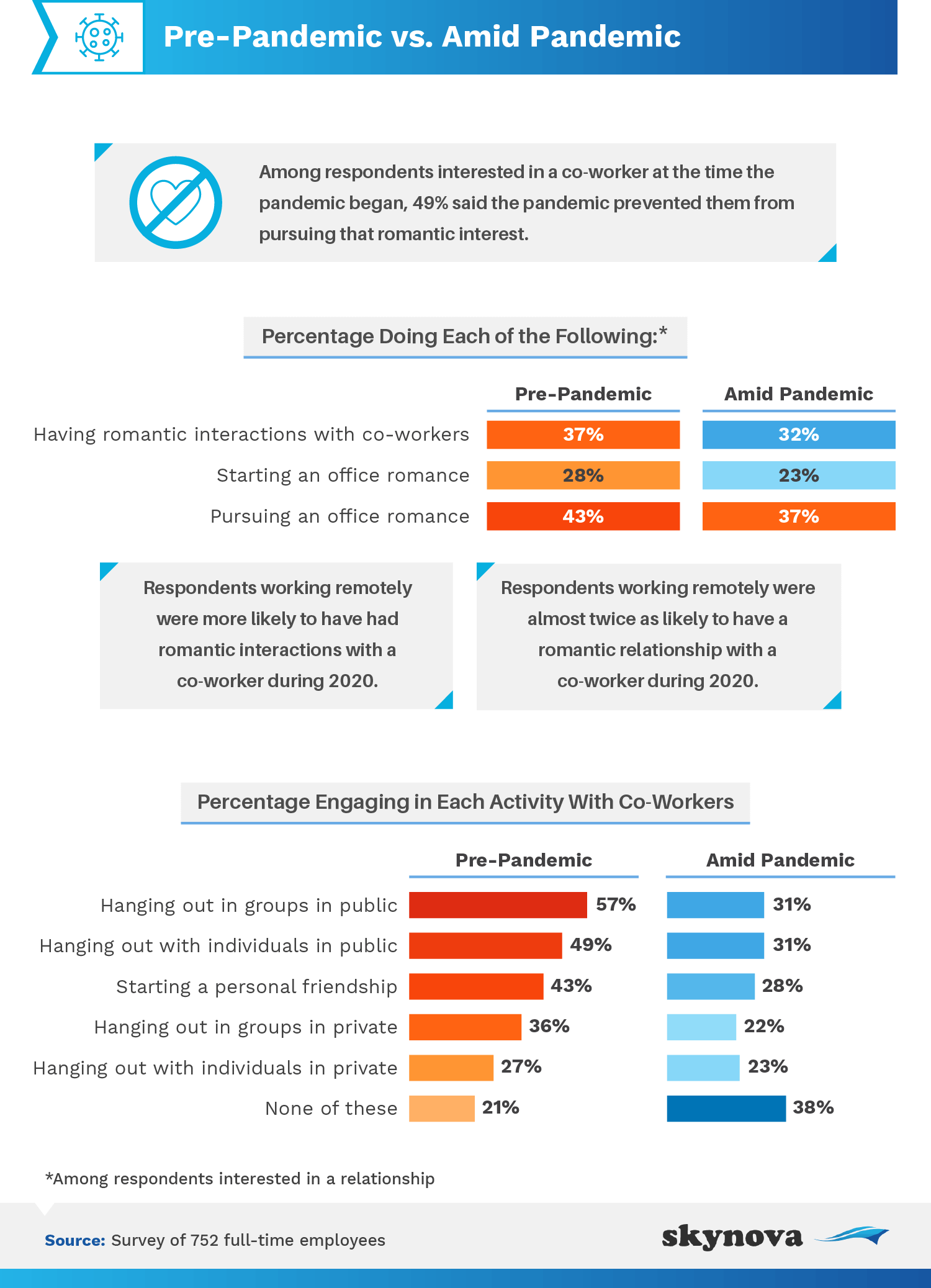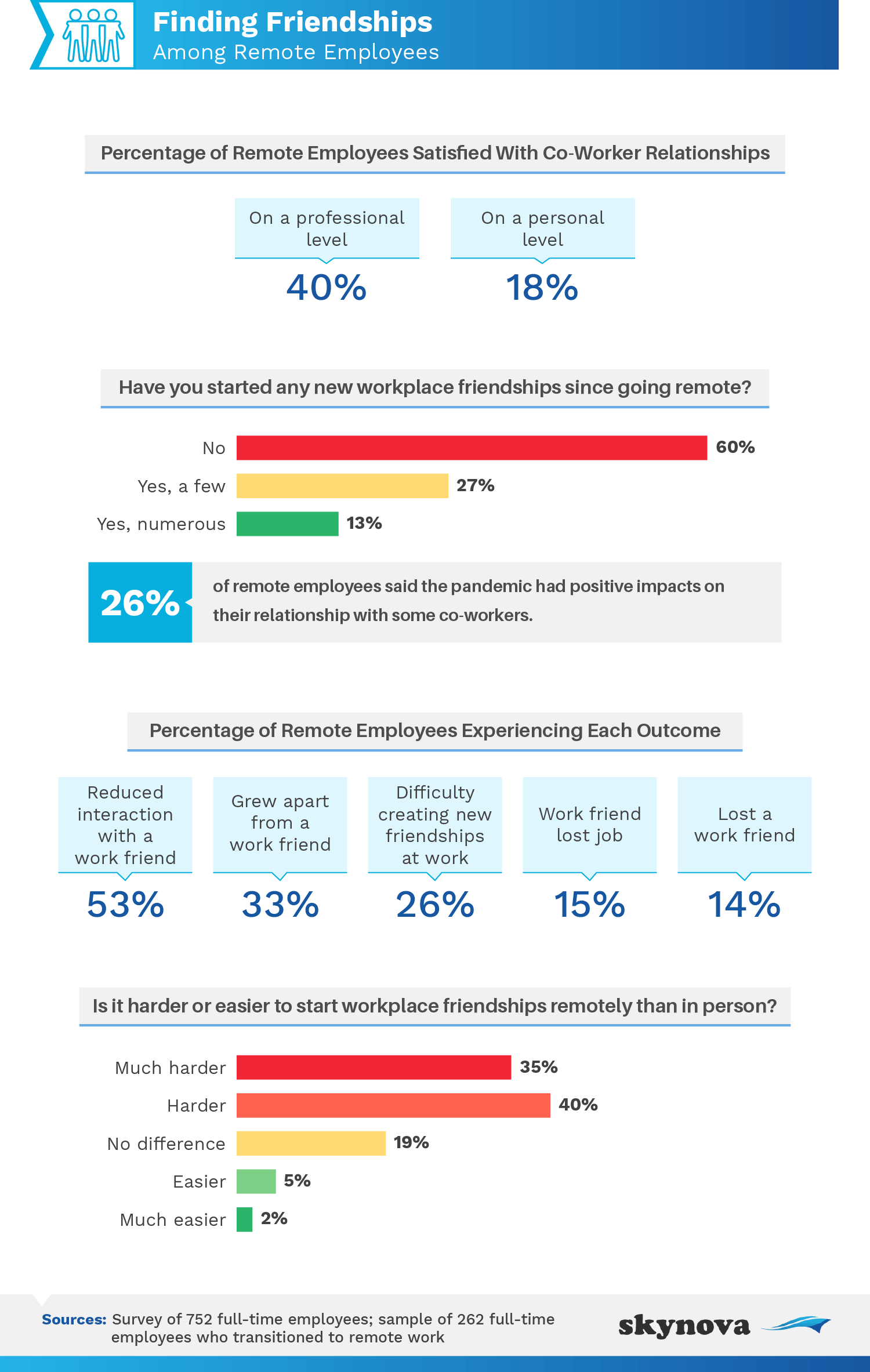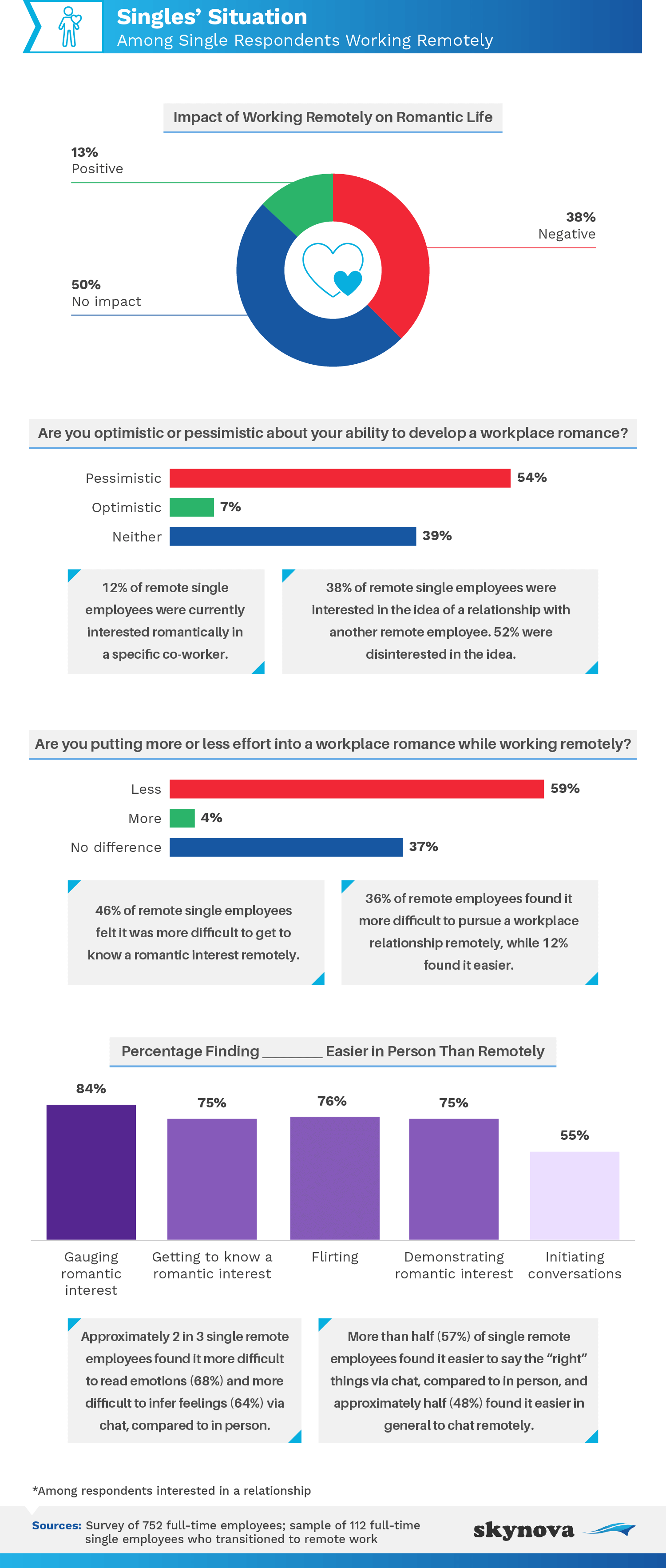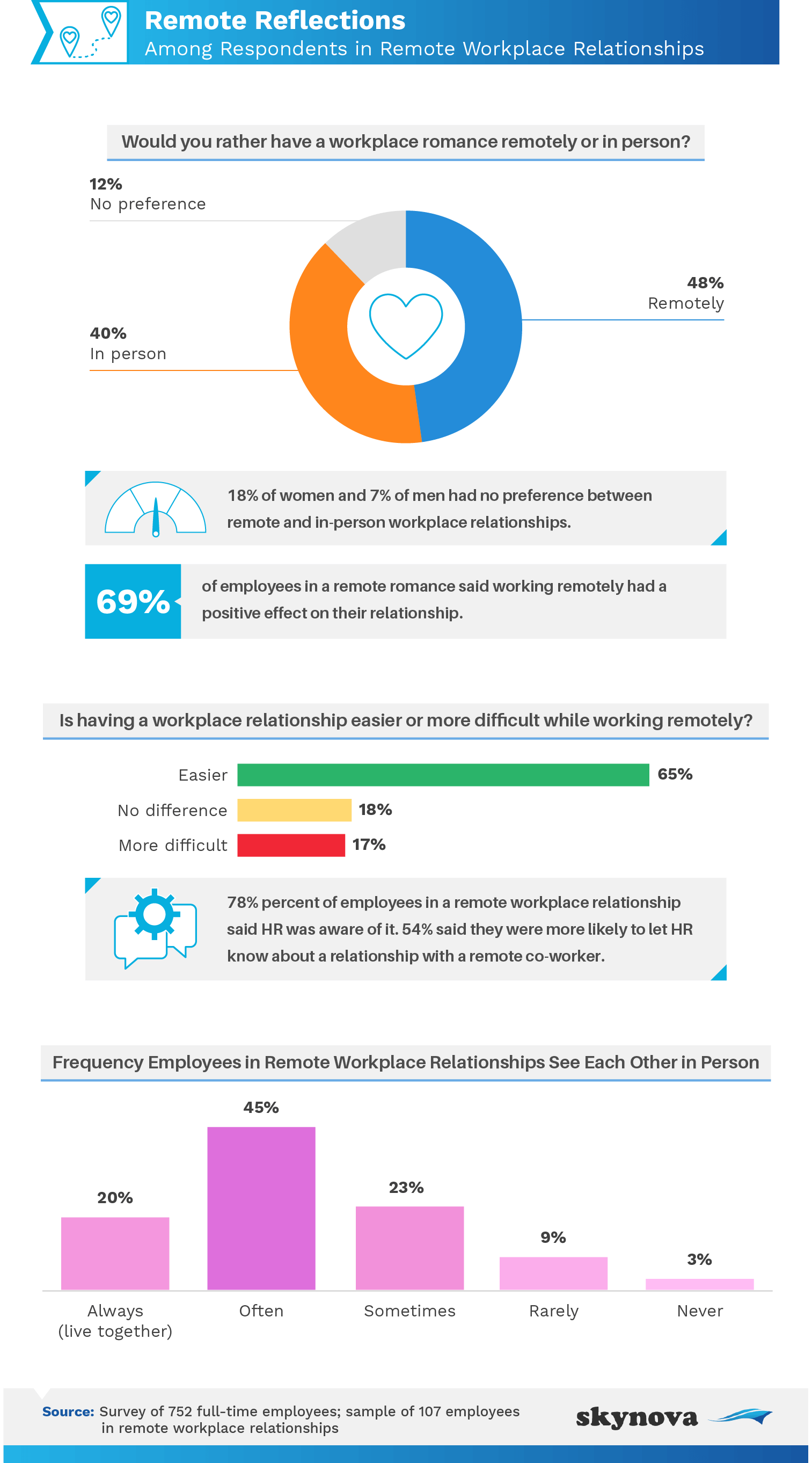
|
Office romances may not be all they're cracked up to be. Sneaking off to the janitor's closet for a quick make-out session or escaping for daily lunch dates may play out on the big screen, but in reality, working with your partner comes with risks. From drama and power dynamics to loss of productivity and potentially your job, experts typically warn against turning office friendships into more. Nevertheless, some people just can't help but fall in love with their colleagues.
Typical workspaces are a breeding ground for love. After all, we spend most of our time working and have little time to meet new people outside of the office. But as the workforce has shifted in response to the COVID-19 pandemic, what has happened to office romances? Are crushing colleagues finding time to flirt over Slack or have employees struggled to form even platonic relationships? We surveyed over 750 full-time employees to get their take on relationships while remote. Keep reading to see what they had to say.
Good news: Office relationships are alive and well. While the coronavirus pandemic sent millions home to work remotely, technology has allowed colleagues to stay connected - seemingly enough to keep the romance flowing.

While 37% of surveyed employees reported having romantic interactions with co-workers before the pandemic, 32% could say the same during the pandemic. The percentage of employees starting a romantic office relationship also dipped during the pandemic, but only slightly.
Along the same lines, employees were more hesitant to pursue an office relationship during the pandemic than before, and it's clear to see why. Before the pandemic hit, nearly 60% of employees hung out with co-workers through public group activities, while 49% hung out with them individually. However, after the pandemic, 38% said they didn't engage in any activities with co-workers - neither public nor private.
Before office romances can bloom, colleagues typically have to form a friendship. But forming friendships can be difficult when there is no physical interaction between co-workers.

A long-term study of a Fortune 500 technology firm found the virtual team's most significant barrier was forming friendships. Pandemic-induced remote work had the same effect. While 40% of remote employees were satisfied with their co-worker relationships on a professional level, a mere 18% said the same about their relationships on a personal level.
Remote workers also haven't made any new friends. Compared to just 13% of employees who said they've started several new workplace friendships since going remote, a whopping 60% said they haven't made any. Of course, the barrier seems to be distance. Since going remote, over half of employees have experienced a reduction in interactions with a work friend, while one-third said they grew apart. That being said, only 7% of employees thought working remotely made it easier to start workplace friendships than working in-person.
Existing workplace relationships weren't the only ones impacted by the pandemic, though.

Single employees working remotely were more likely to say that remote work had a negative impact on their romantic life than a positive one. Despite 12% of single remote employees reporting a romantic interest in a specific co-worker and 38% interested in the idea of a relationship with another remote employee in general, 54% were pessimistic about their ability to develop those workplace romances.
However, a pessimistic attitude may be harming single employees more than the pandemic itself. Just under 60% of single employees admitted to putting less effort into a workplace romance while working remotely - likely because many found it more challenging to get to know someone and pursue a relationship.
Despite the numerous benefits of a remote environment, most employees found specific aspects of relationships easier in person than remote. Eighty-four percent of surveyed employees said gauging romantic interest was easier to do when working in the office than working remotely, with 75% saying the same about getting to know a romantic interest. Even with direct messaging and plenty of emoji or GIF usage, three-quarters of employees said flirting and demonstrating romantic interest was easier in person.
Couples have had to face various obstacles trying to navigate a relationship during the pandemic, and working together could either hurt or help the relationship - even if they're both working remotely.

For those already in workplace relationships, remote work seemed to be preferred. While 40% of taken employees said they'd rather an in-person workplace romance, 48% preferred remote, and 12% had no preference. Sixty-nine percent of employees in a remote workplace romance said working remotely had a positive effect on their relationship; perhaps absence does make the heart grow fonder.
Twenty percent of employees in a workplace relationship were already cohabitating and, naturally, saw each other daily. On the other hand, 45% in an office romance reported often seeing each other in person, and 23% sometimes saw each other. Even in a relationship, though, 9% and 3% of employees said they see their partner rarely or never, respectively. Of course, social distancing rules and existing long-distance relationships could be a factor.
Workplaces often end up being locations for like-minded individuals to get to know each other on a deeper level. Whether those relationships stay professional, platonic, or develop into more, office relationships of all kinds can be hard to navigate. Throw a pandemic into the mix and a reliance on direct messaging and Zoom calls, and many colleagues may be deterred from pursuing any relationships at all. Even though the majority find the beginning stages of a relationship easier to pursue in person, those already in office romances have felt the positive aspects of remote work. Remote or in person, pandemic or not, office romances won't be fizzling out anytime soon.
Skynova provides businesses with online software designed to make organization easier. On top of accounting to tracking time sheets, our services also make it easier to stay up to date on the latest business news. Through in-depth articles based on statistical research, we cover everything business while intertwining technology, politics, sports, health, and more. We curate every report to ensure our customers receive the latest information from a potentially new perspective.
We surveyed 752 full-time employees in three separate surveys. Respondents were selected based on their work and relationship history prior to and during the COVID-19 pandemic. Among those 752 respondents, 262 were respondents who transitioned to remote work due to the pandemic, 112 were single respondents working remotely, 107 were respondents in a romantic relationship with a coworker whom they worked with remotely.
To help gather accurate responses, all respondents were required to identify and correctly respond to a decoyed attention-check question. In some cases, questions and answers have been rephrased for clarity or brevity. These data rely on self-reporting. Potential issues with self-reported data include, but are not limited to, telescoping, selective memory, and attribution errors.
Office relationships have been around forever, but navigating relationships - both platonic and romantic - during a pandemic is a whole new frontier. If you know someone attempting to start or nurture an office relationship, feel free to share this study with them for noncommercial purposes. All we ask is that you include a link to this page so our contributors receive proper credit.